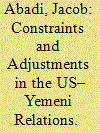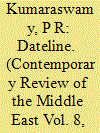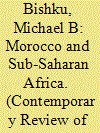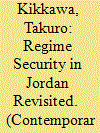|
|
|
Sort Order |
|
|
|
Items / Page
|
|
|
|
|
|
|
| Srl | Item |
| 1 |
ID:
180317


|
|
|
|
|
| Summary/Abstract |
This article analyzes the course of US–Yemeni relations from the 1940s to the present and aims to explain the reasons for the twists and turns in bilateral relations. It argues that the US government never developed a unique “Yemen policy” and that its attitude toward that country was determined largely by its ties with Saudi Arabia. Yemen began to loom large in US foreign policy in the early 1960s when Egyptian President Gamal Abd al-Nasser intervened on behalf of the Republicans who staged a coup against the Royal imamate regime, which relied on Saudi support. The article shows that President John Kennedy looked favorably on the new Republican regime in Yemen despite the robust relations that existed between the United Statesand Saudi Arabia. In addition, it argues that despite the war in Yemen, which lasted from 1962 to 1970 and caused instability in this region, this country did not loom large in US foreign policy. This was largely due to the British presence in south Yemen and especially in the port of Aden, which lasted until 1967. The article shows how the British withdrawal from Aden increased Yemen’s value in the eyes of US policymakers, but even then, no effort was made to fashion a unique policy toward this country. In addition, the article demonstrates how Washington’s attitude changed in 1969 when the country was divided into North Yemen, which tended to regard the Soviet Union as its protector and South Yemen, which continued to rely on US aid. And lastly, the article traces US–Yemeni relations from 1990, when the country reunited, until the present. It demonstrates how the bilateral relations were affected by the superpowers’ rivalry during the Cold War, the fight against terrorism, and disagreement between the Republican and the Democratic parties in the United States.
|
|
|
|
|
|
|
|
|
|
|
|
|
|
|
|
| 2 |
ID:
180314


|
|
|
|
|
| Summary/Abstract |
By posthumously bestowing the Gandhi Peace Prize for 2019 upon Sultan Qaboos of Oman, New Delhi seeks to mend some of the diplomatic faux pas committed by previous governments.1 Over time, India developed such soft power honors to expand its diplomatic footprint. These include having international figures as chief guests for Republic Day celebrations (since 1950) or bestowing the Jawaharlal Nehru Award for International Understanding (since 1965) and International Gandhi Peace Prize (since 1995). There are also nonofficial awards like the Indira Gandhi Prize for Peace, Disarmament and Development (from 1986) to further Indian interests. Due to political considerations, Bharat Ratna, the highest civilian award (since 1954), was also awarded to Nelson Mandela when India’s citizenship is the criteria.
|
|
|
|
|
|
|
|
|
|
|
|
|
|
|
|
| 3 |
ID:
180318


|
|
|
|
|
| Summary/Abstract |
Turkey and Israel have been strategic partners since the 1990s. Yet, there has occurred a deep crisis between the two countries, particularly since 2009, but the beginning of the deterioration in bilateral relations dates to the early 2000s. Today both countries designate each other as opponents despite the history of a strategic partnership. What are the reasons for this radical shift in the Turkish–Israeli relations? How might the stalemate in the relations be explained? This study analyses the rupture in the bilateral relations, particularly on the recent events that paved the way for a rupture and stalemate and evaluates it via three levels of analysis laid by Kenneth Waltz. The study argues that bilateral relations have taken shape at three levels in different times and that the deterioration and amelioration of the bilateral relations hinge upon the identity and ideology of the leadership at the individual level, domestic factors at the state level, and structural factors at the systemic level. In this regard, it seeks to reveal which of the levels of analysis are in play in the determination of bilateral relations since 1948.
|
|
|
|
|
|
|
|
|
|
|
|
|
|
|
|
| 4 |
ID:
180315


|
|
|
|
|
| Summary/Abstract |
During much of the past several decades, Moroccan actions in Western Sahara have impacted on that country’s bilateral and multilateral ties, especially with other countries in Africa, though to a lesser degree in the Arab world. In recent years, Morocco has gained the upper hand in its conflict in Western Sahara and has been increasing its political and economic footprint on the continent of Africa, an area of interest since independence. At the same time, Morocco has regarded itself as a “gateway” to Africa for the USA and Europe, while the USA, France (and the Gulf states) have provided military and financial assistance as well as diplomatic support for Morocco as that country’s policies have served Western interests. While attention is given by academics in recent years to the involvement in Africa of other middle powers from the Middle East such as Turkey, Iran and Saudi Arabia and, in the past, of Nasser’s Egypt and Qaddafi’s Libya, as well as Israel, Morocco has not stirred the same sort of interest. This article seeks to address that issue by examining all political and economic factors that have influenced Moroccan policy toward Sub-Saharan Africa, those both connected and unconnected with the issue of the Western Sahara dispute.
|
|
|
|
|
|
|
|
|
|
|
|
|
|
|
|
| 5 |
ID:
180316


|
|
|
|
|
| Summary/Abstract |
Jordan is one of the few authoritarian Arab regimes that survived region-wide mass protests during the Arab Spring, although the monarchy lacked enough force or resources to neutralize the dissident. This study analyzes the source of the resiliency of the Hashemite monarchy during 2011–2020 concerning regime security. The retreat of the Jordanian democratization movements in the early phase of the Arab Spring was the consequence of the opposition’s failure to achieve coordination and alignment, particularly the internal struggle of the Muslim Brotherhood regarding how to respond and its successful co-optation by the government. The scope of regime security in Jordan experienced a dramatic shift from appeasement to coercion around 2014 because of the eroding social order in neighboring states, represented by the influx of Syrian refugees into Jordan and the rise of the Islamic State in Iraq. Actions for securitization against Islamists, namely increased policing and tighter border control, were arranged through coercion and securing mass support in tandem. Jordan’s experience illustrates how this typically “weak state” secured its survival in this unprecedented, rapidly changing security situation.
|
|
|
|
|
|
|
|
|
|
|
|
|
|
|
|
| 6 |
ID:
180319


|
|
|
|
|
| Summary/Abstract |
Malaysia’s military involvement in the Saudi-led coalition in Yemen Ops Yemen II (2015–2018) had been a subject of rigorous debate in the country. Those who opposed it saw the operation as a breach of Malaysia’s Non-Alignment Policy, especially when it involves military operation in a foreign country’s civil war. The main objective of this study is to critically analyze why and how the Barisan Nasional (BN)-led Malaysian government decided to send armed forces to participate in the Saudi-led military operations stationed in Riyadh. In examining this, an analysis on the role of systemic and leadership factors within the conceptual framework of the foreign policy of developing countries is used to explain the character of Malaysia’s joint military operation with Saudi Arabia in the Yemen Crisis. The method and data analysis of this article were mostly derived from written documentary analysis and discussion with related individuals. The findings indicated that both systemic political pressure and the role of leadership were constantly and constructively influenced intersubjective interactions with other domestic factors, which played a vital role in Malaysia’s decision to join the Saudi-led military operations.
|
|
|
|
|
|
|
|
|
|
|
|
|
|
|
|
|
|
|
|
|